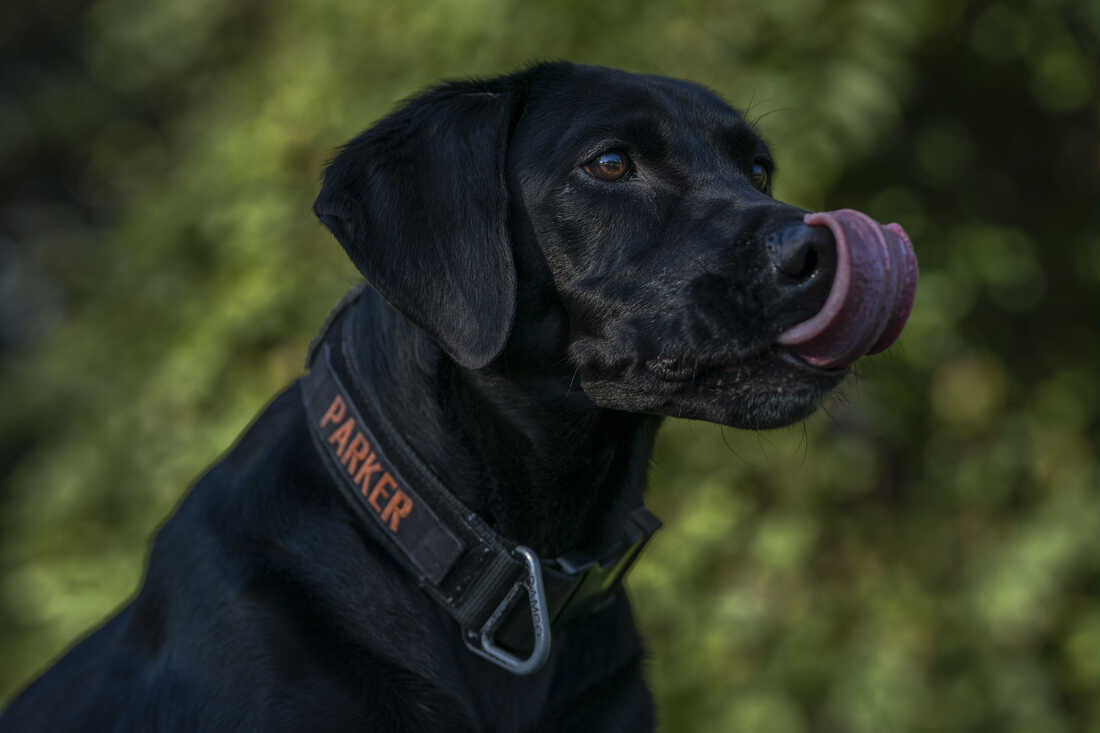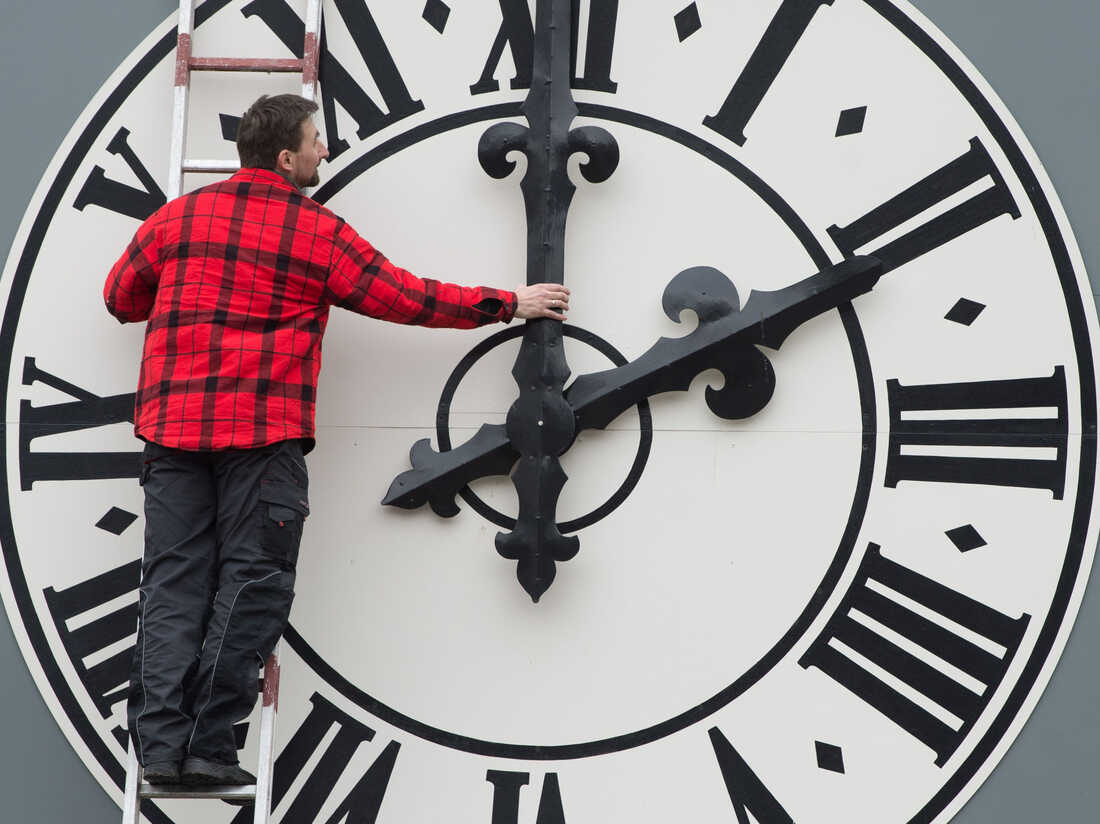When disaster strikes, these good boys and girls are your rescue crew
By Erika Ryan|Scott Detrow
Parker is all about the task at hand. Haiyun Jiang for NPR hide caption
toggle caption Haiyun Jiang for NPRParker is all about the task at hand.
Haiyun Jiang for NPROn a crisp autumn morning, a Labrador with a shiny black coat zigzags over broken concrete and steel rebar. There are overturned boats, piles of wood, a broken-down bus. As he climbs the small mountain of rubble, his nose is down, tail straight. This dog is working — focused and searching for a person.
The thing is, we're at a training ground in the back of a construction site outside Baltimore. The person he's looking for is fine, hiding with a walkie-talkie. And all that rubble was brought in for the purpose of teaching dogs to find people after a disaster, as part of a program by the Federal Emergency Management Agency.
Pager, a 5-year-old search and rescue dog, tries to find someone amid the debris during a searching exercise in Brooklyn in Maryland. Haiyun Jiang for NPR hide caption
toggle caption Haiyun Jiang for NPRPager, a 5-year-old search and rescue dog, tries to find someone amid the debris during a searching exercise in Brooklyn in Maryland.
Haiyun Jiang for NPR
Jeremy Shaffner puts Parker through the routine. Haiyun Jiang for NPR hide caption
toggle caption Haiyun Jiang for NPRJeremy Shaffner puts Parker through the routine.
Haiyun Jiang for NPR"I love this part of it," Ledwell says as she gestures toward a dog doing drills. "They love what they're doing and I love watching that. ... You'll see them come off the pile after they've done a search and they've been successful. Some of them will carry their toy with them, and they're so proud and they'll show it off to you."
As the one overseeing the training, Ledwell begins the day by huddling with about a dozen handlers. She congratulates one team for passing an exam, but when the group claps, the handler brushes it off, directing the praise to the work of his canine partner. "I just stood there and looked pretty. That's my job," he says, laughing.
Parker successfully finds someone in a bark barrel. Haiyun Jiang for NPR hide caption
toggle caption Haiyun Jiang for NPRParker successfully finds someone in a bark barrel.
Haiyun Jiang for NPR
The training site is designed to test all aspects of the canine rescuers. Haiyun Jiang for NPR hide caption
toggle caption Haiyun Jiang for NPRThe training site is designed to test all aspects of the canine rescuers.
Haiyun Jiang for NPRThis dog has just found its prize and the barking goes on for about 20 seconds. The handler lets the dog know the mission is accomplished, and the volunteer inside emerges with a small container of food ready to reward their canine rescuer, along with plenty of pats and praise. In this case the prize was food, but typically it's a specific toy that the dog chose itself. The dog only gets it as a reward during training and missions. When handlers and their dogs are deployed, each has to pack that special toy.
"My last dog had what we called 'the flying squirrel,'" Ledwell said. "It was like a floppy Frisbee, and it didn't fit well into pockets. But it didn't matter that it was hard for me to carry, because for him that was important. I had to make it work."
A lot of the dogs on Maryland Task Force One are Labradors, but the teams are made up of a range of breeds including German shepherds, golden retrievers, springer spaniels and mixed breeds. Some of these dogs started out as strays or in a shelter — dogs like Pager.
Pager is an excitable boy who likes to chew things and lick faces. He's a big Labrador from a kennel in Maine and was sent to a "puppies behind bars" program at just 8 weeks old, where he would've been trained for police or wounded veterans programs. But Pager was too rambunctious and high-energy.

Pager plays with his handler, Joshua Kurland. Haiyun Jiang for NPR hide caption
toggle caption Haiyun Jiang for NPRPager plays with his handler, Joshua Kurland.
Haiyun Jiang for NPR
Parker waits for his handler to throw his ball. Haiyun Jiang for NPR hide caption
toggle caption Haiyun Jiang for NPRParker waits for his handler to throw his ball.
Haiyun Jiang for NPRThat's how he ended up alongside his handler, Joshua Kurland, a canine search specialist with this task force. Kurland has been a handler for more than a decade, and he also works for Montgomery County Fire & Rescue. The fire academy is where he first became interested in working with dogs.
"I probably should've been paying attention to my fire skills, but I saw canines working and I thought, 'Oh, the fire department has canines,'" he says with a laugh.
Kurland and Pager share a moment of fun. Haiyun Jiang for NPR hide caption
toggle caption Haiyun Jiang for NPRKurland and Pager share a moment of fun.
Haiyun Jiang for NPR
It's not all work — there is some play. Haiyun Jiang for NPR hide caption
toggle caption Haiyun Jiang for NPRIt's not all work — there is some play.
Haiyun Jiang for NPR"Pager, hop up!" Kurland shouts as Pager barrels toward the wooden platform and jumps up, only to slide off due to the morning dew. "Pager, back!" After a few tries, Pager gets the hang of it — hopping up when told, then turning around and sitting, waiting for Kurland's approval.
"Pager, come!" He dashes back. "Good boy!" Kurland rewards Pager with his special toy — a tug with a rope on the end — and they play fetch in the field as his reward. It wasn't a perfect run, but it would've passed, according to Kurland.
The team puts on helmets and waits around a massive pile of concrete to send Pager in for another drill. Two people are hiding in the rubble — one volunteer has carefully lowered himself into a concrete tube that's surrounded by bricks and broken slabs for the rescue simulation.
Throughout the rubble are "distractors," such as bags of dirty laundry and food — anything to try to throw the dogs off the scent of finding someone. Kurland takes off Pager's leash and collar and he gets to work. He darts across the pile, nose down, homing in. Within minutes, he's barking, alerting Kurland that he found someone until Kurland carefully makes his way over and rewards him.

Shaffner rewards Parker with some pets. Haiyun Jiang for NPR hide caption
toggle caption Haiyun Jiang for NPRShaffner rewards Parker with some pets.
Haiyun Jiang for NPRHe struggles a bit to find the next person, going back and forth, passing the hiding spot a few times before eventually finding it. Once he begins barking, the volunteer in the tube rewards Pager with his toy and they get into an enthusiastic game of tug of war.
A group of tough handlers in uniform, watching stoically, immediately melt when Pager makes his rescue. As he makes his way back off the pile, they collectively raise their voices an octave to congratulate Pager with pets and baby talk.
To the team, that's potentially another life saved. But to Pager, he's just a very good boy doing his job.



